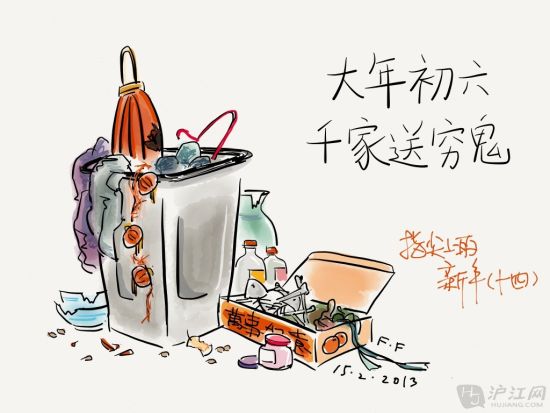春节双语习俗:大年初六 千家送穷鬼(图)
 大年初六 千家送穷鬼
大年初六 千家送穷鬼Chinese New Year on my fingertip 指尖上的新年:大年初六 千家送穷鬼
Today is the 6th day of the 1st month in Lunar Calendar。今天是农历正月初六。
According to traditional customs, families usually send away the Ghost of Poverty (穷鬼, qiong gui) on this day。根据传统习俗,家里通常要在这一天送走穷鬼。
By doing this, Chinese people wish to send sway poverty and welcome the beautiful days and good luck in the new year。通过做这些,中国人希望能送走贫穷并且在新的一年迎来幸福和好运。
According to the legend, the ghost of poverty is a son of an emperor thousands years ago. He was short and weak, and liked wearing ragged clothes and eating poor porridge。根据传说,几千年前穷鬼是一个皇帝的儿子。他矮小而又瘦弱,并且喜欢穿破烂的衣服,喝稀饭。
Even when people presented him with new clothes, he would not wear it until he ripped it apart. So, he got the name of ‘the man of poverty (穷子, qiong zi) with time passing by, he gradually became the ghost of poverty。即使人们送给他新衣服,他也要扯破后才穿。因此,随着时间推移,他被称为了穷子,渐渐地就变成了穷鬼。
To send away the Ghost of Poverty, Chinese people will usually throw away their ragged clothes, rubbish and other dirty things。为了送走穷鬼,人们通常会将自己的破衣服、垃圾和其他脏东西扔掉。
This practice also has its hygienic reason。这一做法也是为了清洁。
As for the first five days of Chinese new year, people are not allowed to throw away any rubbish because the rubbish is regarded as fortune which cannot be swept off。就新年的前五天来说,人们不允许扔掉任何垃圾因为垃圾被视为财富不能被清扫掉。
However, after the Festival of Po Wu (破五, po wu), many taboos can be broken。然而在破五之后,许多禁忌就可被打破。
Thus, people finally can clean up their houses again。于是,人们最后会再打扫一遍他们的房子。
Nowadays, the custom of sending away the Ghost of Poverty is not common to see in big cities。如今,在大城市中送穷鬼的习俗已经不常见了。
(沪江英语)
- 春节双语习俗:大年初八 谷日惜粮食(图)2015-02-15 16:16
- 春节双语习俗:大年初五 开市接财神(图)2015-02-15 16:14
- 春节英语故事:为何十二生肖没有猫(双语)2015-02-15 15:35
- 没有妈妈的搬家:温馨父女“婚照”走红(双语)2015-02-15 14:36
- 遵循七种方法带你找到人生真谛(双语)2015-02-15 10:41
- 动物双语趣知识:为何袋熊的便便是立方形?2015-02-15 10:44

















闂備礁鎼崐缁樻櫠濡も偓椤繈顢欓悙顒€顎忛梺鎸庢煣閸曟ɑ绂掑☉銏$叆婵炴垶鐟ч悡顖炴煙楠炲灝鐏柟宄版嚇瀵挳鎮㈤崨濠冪槕闂佽崵濮甸崝鏇犵礊婵犲洢鈧倿鍩℃导鍗炴贡閳ь剨缍嗘禍婊堝礂婵犲嫮纾煎ù锝夋涧婵¤櫣绱掗崣妯哄祮鐎规洏鍔岃灒闁兼祴鏅滈幆锝呂旈悩闈涗粶闁诲繑绻堥獮澶愭晸閻樺啿鍓梺绯曞墲濞叉繄绮堢€n喗鍋i柛銉戝懎鈪甸梺缁樼◤閸庣敻寮鍛殕闁告劖鍎冲▓鏌ユ⒑閸涘﹥绀€闁靛洦岣跨划顓㈠磼濠靛嫪姹楅梺鐟扮仢鐎氼喚澹曢敓锟�闂備胶绮崝妤呭箠閹捐鍚规い鏃囧Г娴溿倖绻涢幋鐏活亜顕i幎鑺ュ仯闁搞儳鍏樺顕€鏌涙惔顖涘